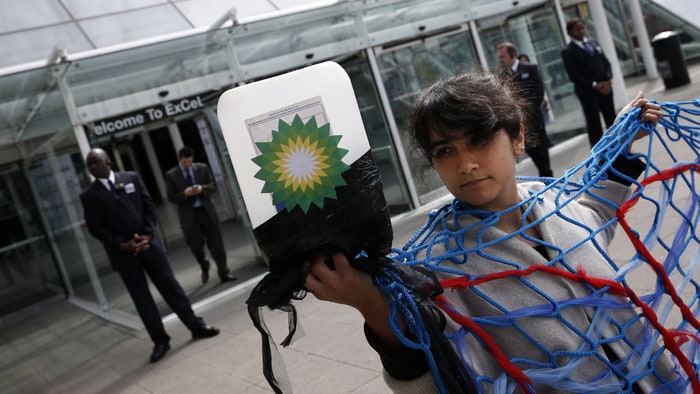BP ‘Got Off Cheaply’ With $18.7 Billion Settlement.

 The U.S. Justice Department announced Thursday that the United States, together with several state and hundreds of local governments, had reached a settlement for all remaining civil claims arising from the April 20, 2010, BP Deepwater Horizon explosion in the Gulf of Mexico, which killed 11 men and set off the largest offshore oil drilling spill in history.
The U.S. Justice Department announced Thursday that the United States, together with several state and hundreds of local governments, had reached a settlement for all remaining civil claims arising from the April 20, 2010, BP Deepwater Horizon explosion in the Gulf of Mexico, which killed 11 men and set off the largest offshore oil drilling spill in history.
If the proposed consent decree is approved after being submitted for public comment and then court-approval, BP will agree to pay $18.7 billion in fines over the next 15 years to the U.S. federal government and the state governments of Alabama, Florida, Louisiana, Mississippi and Texas.
The federal government had originally sought $18 billion in Clean Water Act (CWA) fines alone. Yet, the $18.7 billion settlement includes not only these fines, but also those meant to address all natural resource damages and restoration, as well as economic losses incurred by state and local governments.
—$5.5 billion in total Clean Water Act fines;
—$7.1 for ecological and wildlife harms and restoration, referred to as “natural resource damages” (in addition to the $1 billion BP had already committed);
—$5.9 billion to settle claims by state and some 400 local governments for economic damages; and $600 million for other claims, including claims for reimbursement of Natural Resource Damages Assessment (NRDA) costs and other unreimbursed federal expenses due to Deepwater Horizon activity.
Mark Lyons, regional administrator for Oxfam America, which has been working for economic equity in the Gulf of Mexico for 20 years, tells Rolling Stone that “BP got off cheaply.” He added, “The judge had already found gross negligence, and based on the Clean Water Act formulas, BP should have been looking at $13 to $18 billion for the oil spill alone. Add to that the natural resource damages and the fact that there is enough research on oil spills in general and the shock to Gulf in particular to say that a settlement at this level is both premature and cheap. It’s a bargain for BP.”
BP would seem to agree. BP’s chief financial officer, Brian Gilvary, said in a press release, “The impact of the settlement on our balance sheet and cashflow will be manageable.” This is because BP has already estimated total costs for all economic damages resulting from the disaster at some $43 billion.
BP now estimates that its total cost will be somewhere around $53 billion — an amount below the predictions of analysts at Moody’s rating agency, who in 2011 estimated a total cost to BP of $60 billion.
U.S. Federal District Judge Carl Barbier had previously found BP grossly negligent for causing the April 20th, 2010 blowout of the Macondo oil well, opening BP to as much as $4,300 per barrel of oil spilled under the CWA. Though government scientists had argued that 4.19 million barrels of oil spilled into the Gulf, Judge Barbier ruled that the amount was 3.19 million barrels, reducing the potential maximum CWA penalty from $18 billion to $13.7 billion. (In March, Rolling Stone predicted that Barbier was not likely to impose this full fine).
Meanwhile, federal, state and local government agencies were working with hundreds of scientists on the NRDA required under the Oil Pollution Act to determine how much BP must pay to restore the Gulf Coast back to the condition it was in at the time of the disaster. The vast majority of this analysis has not yet been made public due to the legal proceedings. Yet numerous reports have recorded extensive and ongoing damages likely to reach costs far higher than the $8 billion allocated here.
The National Wildlife Federation, for example, estimated that the NRDA fine alone should total some $31 billion.
Eighty percent of the CWA fines will be turned over directly to the states (thanks to passage of the RESTORE Act) for restoration. The states will also receive direct natural resource damage fines.
The settlement, which would be the largest environmental settlement in U.S. history and the largest civil settlement with a single entity ever, comes just days after the U.S. Supreme Court rejected BP’s bid to insulate itself from any fines under the U.S. Clean Water Act (CWA) and as Judge Barbier was preparing to release his final finding determining the CWA fines.
